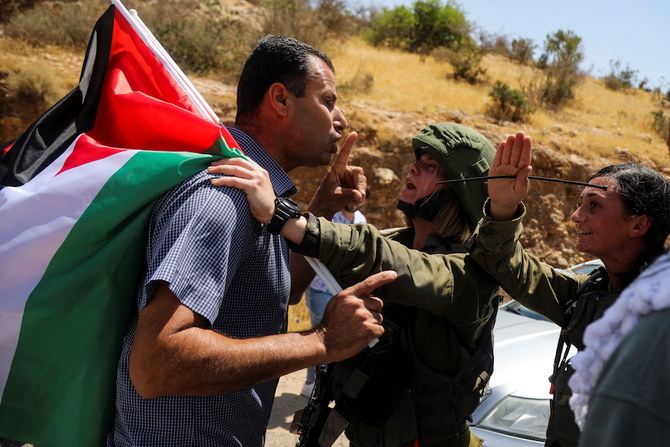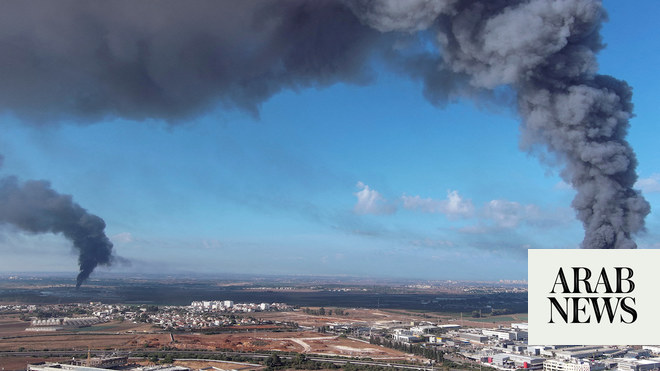
One might be forgiven for feeling a strong sense of deja vu as, once again, we are forced to question the rationale for the latest round of hostilities between Israelis and Palestinians in Gaza, with Islamic Jihad this time Israel’s specific opponent.
As might be expected, both sides declared victory but neither has any solid evidence to back up that claim. Israeli Prime Minister Benjamin Netanyahu, with his typical pomposity, announced that Israel “rewrote the equation” in its relations with Gaza, telling his Cabinet that the Israel Defense Forces and security agency the Shin Bet “took out the entire leadership of the Palestinian Islamic Jihad and, by doing so, fulfilled the goals of the mission in perfect form.”
Islamic Jihad, for its part, sent its supporters onto the streets of Gaza after a ceasefire was declared, waving Palestinian flags and flaunting victory signs from speeding vehicles.
The term pyrrhic victory — a win in name only that is achieved at too great a cost — was coined to describe this kind of situation.
Israel did not win this round of hostilities, in the same way that it has won none of its previous clashes in Gaza. Had it been victorious in any of these military “operations,” all of which claimed many Palestinian lives (most of them noncombatants) and inflicted terrible devastation, it would not find itself back in the very same position of needing to initiate yet another round of air raids and shelling, as it did last week.
Israel has targeted an enormous number of leaders and operatives of Islamic Jihad, and of Hamas since it came to power in Gaza in 2007, but this has not stopped either organization from building and rebuilding their military capabilities.
The deaths of leading militants from Islamic Jihad are certainly a setback for the organization but it does not change the nature of relations between Israel and the Gaza Strip, which for all intents and purposes is functioning as a de facto independent political entity, with which Israel is unwilling to politically engage and is incapable of defeating militarily.
These two premises dictate Israel’s punitive approach to Gaza and its people, with a corresponding lack of any viable long-term strategy.
At the end of another five days of bloodshed, it is just a matter of time until Islamic Jihad fills the positions of those who were killed. Meanwhile, it is mainly ordinary Gazans, as usual, who have been left to pick up the pieces.
The available figures paint a bleak picture: 35 Palestinians killed, including at least 13 civilians, six of whom were children, and 147 Palestinians injured, many of them severely, including 48 children.
These are horrific numbers that only perpetuate the conflict. They do not “change the equation” (whatever that means) as Netanyahu claims but merely reinforce an existing pattern of relations between the two antagonists. Destroying or damaging hundreds of houses, leaving families displaced and without shelter, does not guarantee Israel peace and calm along its border with Gaza.
The bravado-based claims from Israeli leaders of having defeated the enemy amount to no more than kicking the can further down the road, because no Israeli government thus far has had the courage to admit to itself, let alone to the Israeli public, that there is no military solution to Gaza — not one that is desirable at any rate — only a political-diplomatic one.
The futility of what Israel calls an “operation” feels more like a war for those who live in Gaza, one that in addition to physical destruction also inflicts tremendous psychological scars, especially on the young.
This was exposed rather quickly when, within days, Israel ran out of what it calls a “bank of targets” and at that point desperately needed to reach a ceasefire agreement. After all, the longer that militants, in this case Islamic Jihad, are capable of firing rockets, the more Israel is seen as falling short in its deterrence efforts despite overwhelmingly superior military capabilities.
Israel did not win this round of hostilities, in the same way that it has won none of its previous clashes in Gaza.
Yossi Mekelberg
Israel also runs the risk of provoking Hamas into joining the fray, thereby increasing the possibility of the hostilities spreading to the West Bank and East Jerusalem, and even into Israel proper as was the case two years ago.
From the perspective of Islamic Jihad, and despite the losses it suffered, its ability to continue firing rockets and disrupting lives deep inside Israel might be far from a victory but it keeps the military struggle alive and, with that, the relevancy of this small organization.
However, these “achievements” ring as hollow as those declared by the Israelis, given that they do not improve the lives of Palestinians one iota, nor bring them one inch closer to statehood, especially not by targeting civilians. They merely give the Israeli government an excuse to sow death and devastation throughout the Gaza Strip and impose even harsher restrictions on entry and exit.
What this latest, futile five days of death and destruction markedly failed to do was lure Hamas into joining the battle, and there is something to be learned from the decision of the leadership of that organization to steer clear of the confrontation.
Cynics might suggest that Hamas did not shed any tears as it watched its smaller rival suffer losses. As much as there might be some truth in that, Hamas was nevertheless also under pressure to respond because, as the governing body of this territory, it has a responsibility to protect its people especially as civilians, too, have fallen victim to the Israeli attacks.
However, and not for the first time, its leadership showed a notable degree of pragmatism in recognizing that it would gain nothing from escalating and prolonging the hostilities, and had much to lose.
Currently, Israeli authorities grant work permits to 18,000 Gazans, which makes a considerable difference to the local economy and the taxes that Hamas is able to collect. In addition, it allows about 350 trucks a day to enter Gaza, thereby easing some shortages of goods. Against the backdrop of the stalemate over finding a long-term solution, this at least provides an opportunity for engagement between Israelis and Palestinians, even if it has to take place through a third party, with the aim of expanding the arrangement and, by doing so, improving the lives of Gaza’s 2.2 million Palestinians.
Moreover, in the absence of any direct lines of communication between Israelis and the leadership in Gaza, the role of a third-party mediator has proved to be crucial, and in this case it was Egypt that took it on.
However, attempts to prevent another, seemingly inevitable, round of bloodshed and destruction demand that such efforts continue. As long as the blockade of Gaza continues, the area will remain a hotbed of radicalism and conflict. Reducing the likelihood of armed confrontation demands the alleviation of the extreme humanitarian crisis created by the Israeli blockade — namely by ending it.
Yossi Mekelberg is a professor of international relations and an associate fellow of the MENA Program at Chatham House. He is a regular contributor to the international written and electronic media. Twitter: @YMekelberg












